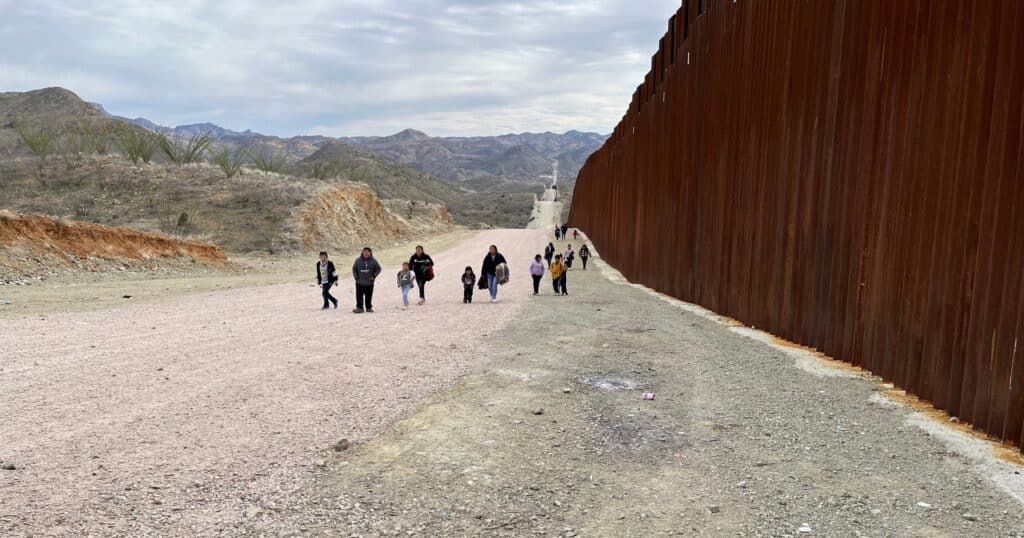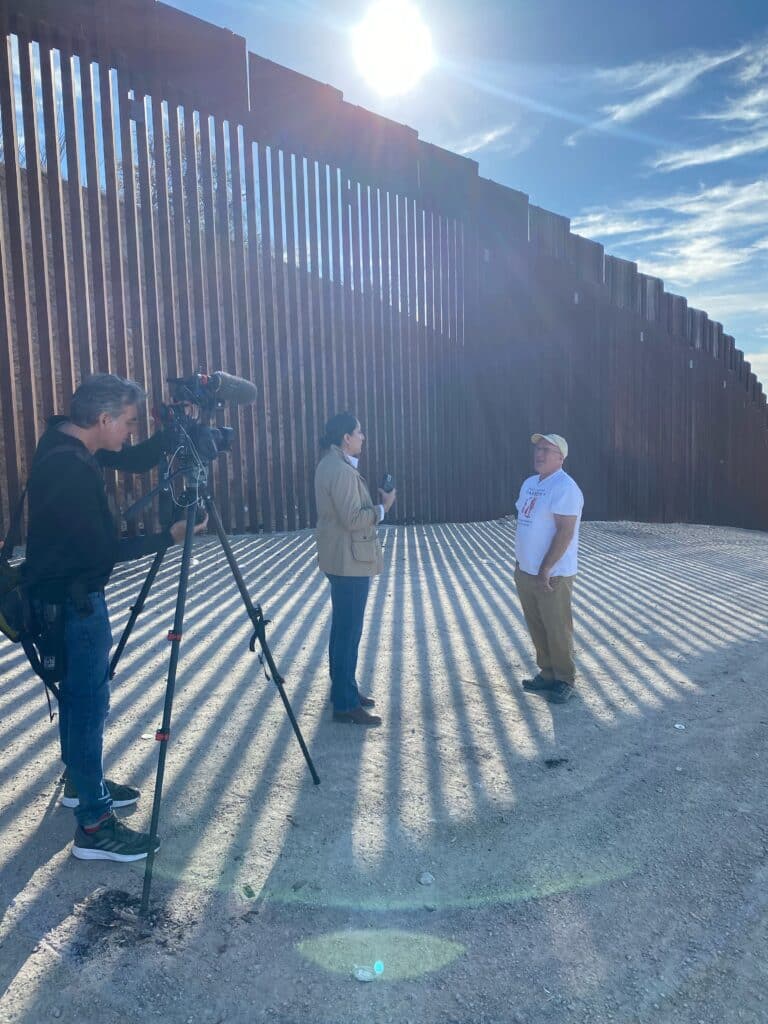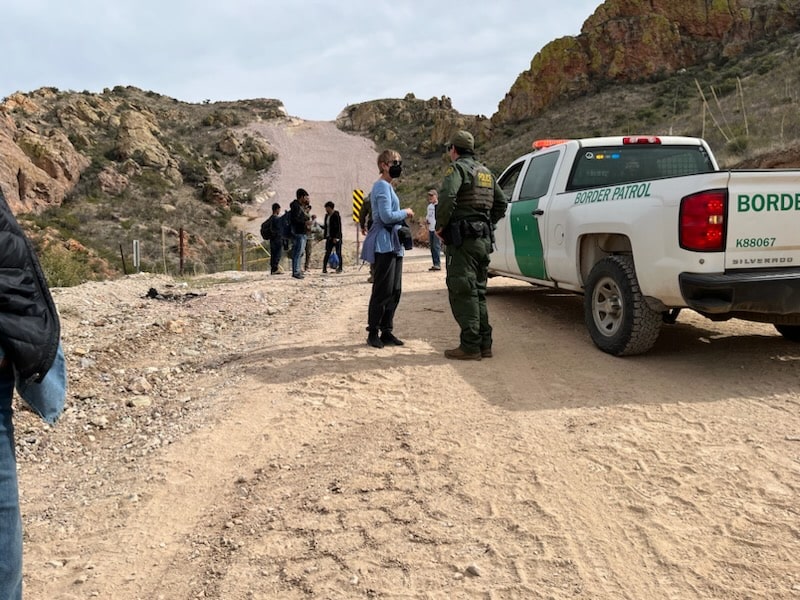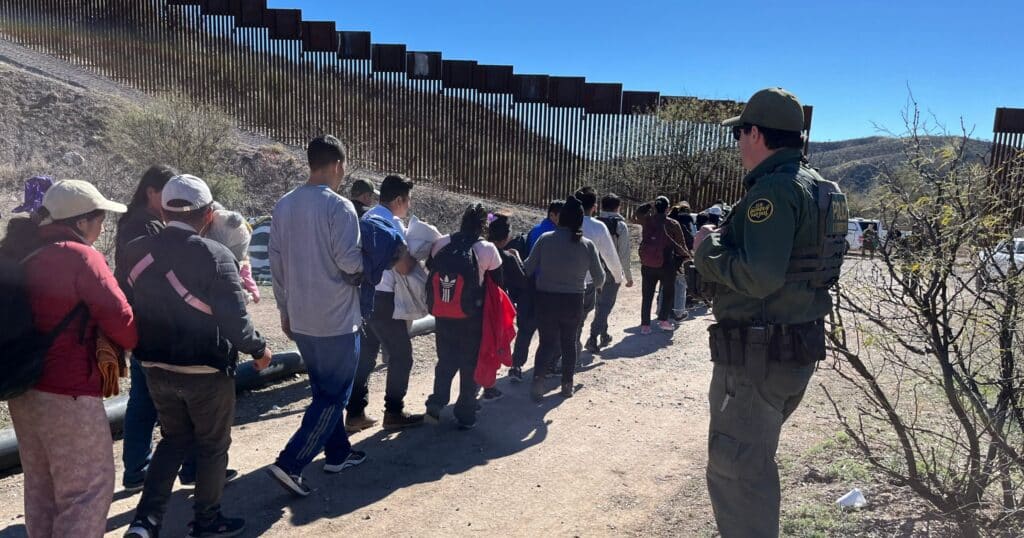As migrants from ‘all over the world’ enter U.S., churches must go to meet them, says Arizona pastor
More and more people from more and more countries are risking the perilous journey across the U.S-Mexico desert to find safe haven and sanctuary for themselves and their families. And yet, already limited government funding for a humanitarian response to these asylum seekers is under threat while militarization of the U.S. border increases.
That’s what the Rev. Randy Mayer is witnessing. Mayer is a United Church of Christ pastor who, along with his congregation — The Good Shepherd UCC in Sahuarita, Arizona — has been going out into the desert to welcome migrants to their community and country for more than two decades.
But the sheer number of people from all over the world that he’s encountering now is “mind boggling,” he says. “Over probably the last six months or so, we’ve just seen this incredible increase of asylum seekers.”
While the desert where The Good Shepherd’s Samaritan program operates has long been a “hotspot” for migrants, Mayer estimated they are meeting 150 to 200 people daily.
While politicians stoke fears about these families, Mayer sees thousands of people who are simply looking for a place to live and work until it’s safe for them to return to their homes.
“Everybody out there has been through hell to get to that place,” he said.
A ‘United Nations experience’
Mayer recently spent time with journalists from PBS who have been documenting the realities of life at the border for migrants. What they found were people from around the globe: Senegal, Bangladesh, Cuba, Mali, Nepal, Ecuador, as well as Central America.
“It’s just become like this United Nations experience out there,” Mayer said.

This recent development has been particularly interesting to Mayer. The situation reflects what longtime partners in Italy, Mediterranean Hope — the refugee and migrant program of the Waldensian Church and the Federation of Protestant Churches in Italy — have experienced for years.
Two months ago, Global Ministries and other international faith-based programs hosted a conference with these Italian partners to hear about their experiences and the experiences of “people on the move,” as Global Ministries’ Peter Makari recently told UCC News. Thanks to Makari, Mayer and others working in U.S.-based migrant ministries remain connected to their European counterparts, as they share solidarity, stories, and information with each other.
Last fall, Mayer himself witnessed the arrival in Italy of people from Africa, the Middle East, Southeast Asia, and more.
“My wife and I got to go down onto the docks and welcome people from all over the world as they were getting brought in from the coast guard,” he said.
Mayer didn’t expect that, within a month or so after his visit to Italy, he would start seeing people from these countries showing up in Arizona. His hunch, he said, is that European borders are becoming shut off to these migrants, and so they’re having to travel for months and miles to try to find safety here in the United States.
True meaning of communion
For many of these families from many different countries, the situation remains dire. Mayer blames centuries of colonization, which “created the climate where people can’t really live in their own countries.”
“Their land and their economies were harvested long ago,” he added, “and now people are just following what was stolen from them generationally.”

Looking for a safer and more financially stable life, they are making their way to Arizona, California, and Texas. When Mayer and his church members meet them, the people of the Good Shepherd bring migrants food and water, telling them, as Mayer related, “Friends, welcome to the United States. We’re glad you’re here. You’re going to make our country better.”
These encounters, he said, are “holy moments” of radical welcome and, in a way, communion.
“When they finally cross into the United States, they literally fall on knees and thank God and say, ‘This is my dream; I’m finally here,’” Mayer said. “It’s a really sacred experience to minister and give basics, food and water, clothes. It’s almost like you’re giving communion — food and water, bread and cup. This is the true meaning of communion.”
Funding threatened
But from there, Mayer worries about what kind of welcome they will receive.
First, if they’re lucky, they’ll end up at a shelter where they can receive some services, discounted transportation rates, and basic necessities. However, funding for those shelters will run out by the end of this month unless the federal government acts.
“You’re going to end up with three or four thousand people just living on the streets with no money, no food. Where do you go, and how do you get there? Nobody speaks their language,” said Mayer. “It’s cruel, it’s absolutely cruel to create that sort of chaos for people.”
Meanwhile, in Texas, state officials are targeting places that welcome and house migrants. The Texas attorney general, Ken Paxton, is attempting to investigate Annunciation House, a faith-based network of shelters in El Paso. Last week, a state judge blocked Paxton’s subpoena.
But this level of legal “scare tactics” to a non-profit service provider has alarmed advocates, such as Mayer and the Rev. Noel Andersen.
“I think this idea is meant to try to put fear into people,” said Andersen, who serves as the UCC’s minister for immigration justice and national field director for Church World Service’s organizing, policy and advocacy team. “It’s very much an attack on faith and an attack on religious freedom.”
Many UCC churches, clergy, and members recently signed an interfaith statement “to express solidarity with Annunciation House and decry the attempted criminalization of their faith-based work,” according to the Interfaith Immigration Coalition, which the UCC is a member of.
Andersen called the targeting of Annunciation House part of a “broader pattern” of political efforts to dissuade non-governmental organizations from helping asylum seekers.
‘Are they going to find people that love them?’
At the same time, the Texas government continues to bus migrants to cities such as New York, Los Angeles, Denver, and Boston as part of a “political spectacle,” as Mayer put it.
Even if they make it safely through, The Good Shepherd pastor isn’t sure whether they’ll end up in a welcoming place.
“My fear, every time I see people and I welcome them at the border, is how are they going to be received in the United States: will they find friends or are they going to find anti-immigrant people that are going to beat them down?” Mayer said. “I just fear for people that they’re going to end up in communities that aren’t going to be understanding and aren’t going to walk with them. Are they going to find people that love them, or are they going to find people that hate them?”

Mayer hopes that UCC congregations across the country can help “change the immigration conversation” by going out and demonstrating love and welcome to migrants in their own neighborhoods.
“We can’t just stay in our churches,” he said.
Like The Good Shepherd, he is calling on faith communities to meet these new arrivals where they are rather than waiting to see who trickles through the church doors.
“These migrants are just salt of the earth, kind, loving, thankful people,” said Mayer. “I always say it could change the United Church of Christ if we actually lived out our radical hospitality and don’t demand that people come through our doors. That’s not what Jesus did.”
Witness and welcome
Mayer’s congregation recently received a UCC grant to support their ministry, thanks to donations from the One Great Hour of Sharing special mission offering.
“We need the money,” Mayer said, noting that they spend hundreds of dollars a day on food and other necessities for migrants.
This witness and welcome, along with continued advocacy for comprehensive immigration reform, is the kind of change churches can help make.
“It’s a painful, painful place right now out in the desert,” Mayer said, “because of the political climate, because our politicians, both right and left, only have one solution — more security and more Border Patrol agents and more wall — because that’s their only answer to this, for over 30 years.”
This singular focus on security, rather than reforms like expanded work programs, has led to a much more dangerous and volatile situation at the border, according to Mayer.
“Our borderlands have militarized to satisfy the fears of middle America,” he said.
Instead, he wants to see more just, humane, and creative solutions for the new neighbors arriving across the desert.
“How can we be so inhumane as to allow people into our country and not give them the welcome?” said Mayer.
Content on ucc.org is copyrighted by the National Setting of the United Church of Christ and may be only shared according to the guidelines outlined here.
Related News
A Prophetic Call for Justice and Peace in Palestine
The executive leaders of the United Church of Christ have issued the following statement...
Read More‘Love is Greater Than Fear’: Regional Youth Events get to the heart of gospel message
United Church of Christ teens attending this summer’s Regional Youth Events (RYE) are...
Read MoreUCC desk calendars available to order now
Prepare for your day, month and year with the United Church of Christ desk calendar —...
Read More


